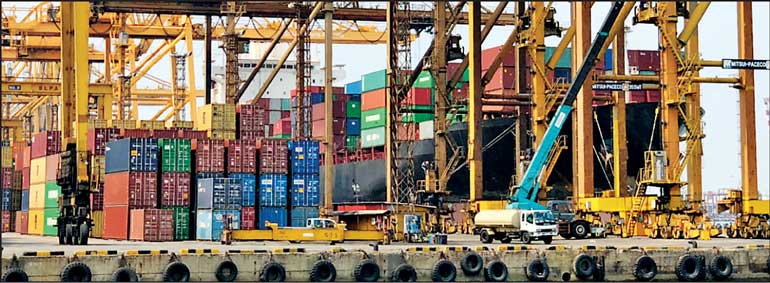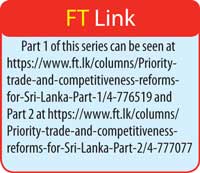Monday Feb 16, 2026
Monday Feb 16, 2026
Friday, 13 June 2025 00:28 - - {{hitsCtrl.values.hits}}

 Last month (15 May), President Anura Dissanayake met with newly appointed Sri Lankan diplomats to advise them that ‘expanding opportunities to attract Foreign Direct Investment (FDI) and identifying new market opportunities for entrepreneurs’ were key duties of the diplomatic service. He was speaking to newly appointed diplomats to our missions in important trade and investment destinations, including India, Pakistan, United Kingdom, United Arab Emirates, and Japan. While the President’s message is vital and timely, unfortunately the reality is that Sri Lanka’s has consistently neglected this agenda.
Last month (15 May), President Anura Dissanayake met with newly appointed Sri Lankan diplomats to advise them that ‘expanding opportunities to attract Foreign Direct Investment (FDI) and identifying new market opportunities for entrepreneurs’ were key duties of the diplomatic service. He was speaking to newly appointed diplomats to our missions in important trade and investment destinations, including India, Pakistan, United Kingdom, United Arab Emirates, and Japan. While the President’s message is vital and timely, unfortunately the reality is that Sri Lanka’s has consistently neglected this agenda.
A recent Policy Note published by the Centre for a Smart Future (CSF) outlined eight priority trade and competitiveness reforms for Sri Lanka, in responding to global economic challenges. In previous articles (16 May and 29 May), we recapped key messages from Priority Areas 1, 2, 4, 5 and 6 contained in the Policy Note. In this third and final article in the series, we cover Priority Area 7 – ‘Advancing Commercial Diplomacy’.
Commercial diplomacy as a driver of trade and investment
The foreign service is Sri Lanka’s front line when facilitating entry into frontier export markets and responding to international shocks such as tariff increases. A growing body of international literature, including Rose (2007), establishes that diplomatic presence can have a significant positive impact on trade flows. Such impacts can vary due to factors such as the types of goods traded (Moons and de Boer 2014), the firm size of traders (Ferguson and Forslid 2019) and the type of host market (Van veestra 2011; Moons and van Bergeik 2018). On investment flows, in a meeting with the new diplomats, the head of Sri Lanka’s Board of Investment (BOI) noted that they should “leverage their networks to create opportunities for partnership and investment in Sri Lanka’s growing economy”. Though the impact of commercial diplomacy on investment inflows is less explored, Fry-McKibbin et al (2019) observed an increase in Australian FDI inflows by 22 per cent through diplomatic efforts.
President’s message vs. the reality
A study conducted by CSF in June 2024 for the Sectoral Oversight Committee on International Relations of the 9th Parliament highlighted that Sri Lanka’s commercial diplomacy apparatus suffers from a range of issues – from a lack of clear vision and long-term strategy, low funding and resources, unclear monitoring and evaluation, and a highly fragmented institutional environment with competing and overlapping mandates.
Key stakeholders CSF interviewed – from across the private sector and public sector (including diplomats) – highlighted that due to resource constraints, commercial officer postings are often held vacant when officers retire or shift postings. This leads to either foreign service officials lacking necessary skills and expertise engaging in commercial diplomacy, or staff assigned for commercial affairs experiencing mission creep due to increasing consular work. Due to limited and strict budget constraints and procedures, often officers find it unable to participate in strategic opportunities. In a space where professional network building pays considerable dividends, as pointed out in the Guide to Commercial Diplomacy by the International Trade Centre, Sri Lanka’s commercial officers lack the conducive environment to be ‘entrepreneurial’ in their efforts to attract trade and FDI.
 As per the Ministry of Foreign Affairs Website Sri Lanka had 60 missions, and 106 honorary consuls situated in 106 countries globally, as of June 2025. Each of these posts had a mandate to advance commercial diplomacy. In addition, 28 such countries were allocated a commercial officer, though some posts remain vacant.
As per the Ministry of Foreign Affairs Website Sri Lanka had 60 missions, and 106 honorary consuls situated in 106 countries globally, as of June 2025. Each of these posts had a mandate to advance commercial diplomacy. In addition, 28 such countries were allocated a commercial officer, though some posts remain vacant.
While commercial officer postings broadly cover the current major trade partners of Sri Lanka, such postings have not extended to countries with high potential. For instance, a preliminary analysis of Sri Lankan export data from 2014-2023 indicates that Mexico, Spain, Hungary, and Peru are countries with no missions on the ground that Sri Lanka has increasingly exported to. In contrast, Kenya, Iraq, and Netherlands are countries with significant growth in exports which have Sri Lankan missions but not commercial officers. Jordan is a country in which Sri Lanka’s exports rapidly bounced back, post-COVID but it has no commercial officer in the diplomatic mission.
Commercial diplomacy efforts, even in the countries that President Dissanayake recently appointed diplomats to need renewed focus if Sri Lanka is to increase trade and investment flows. As of June 2025, the Department of Commerce indicates that the allocated commercial officer posting for Japan remains vacant. Similarly, though two commercial officer posts are allocated to the United Kingdom, one is indicated as vacant. Sri Lanka’s exports to both these countries have seen a decline on average over the past decade, indicating a critical need for a consistent strategy to eliminate barriers and find new opportunities.
Actioning the President’s message
As Sri Lanka is pushed to explore alternative markets and forge new partnerships, commercial diplomacy must be utilised as a proactive mechanism. While fiscal constraints persist, policies can focus instead on establishing long-term commercial diplomacy strategies for high-potential economies and bridging the gap between the private sector and the commercial diplomatic apparatus.
In April 2025, a multi-institutional dialogue took place between Sri Lankan overseas missions, exporters, and industry professionals. It is encouraging to note that leadership was jointly provided by the Ministries of Foreign Affairs, Foreign Employment and Tourism, Ministry of Industry and Entrepreneurship Development and the Sri Lanka Export Development Board (EDB). Formalising such platforms and fostering consistent cross-institutional engagement is key to align diplomacy efforts with strategic economic needs.
Here are five urgent action points for Sri Lanka to advance commercial diplomacy and meaningfully act on the message that the President gave to the diplomatic service to drive FDI and expand markets for our businesses.
1. Prioritise market intelligence and information dissemination by providing clear, accessible, and comprehensive information about investment and trade opportunities, regulatory frameworks, and market conditions to potential investors and exporters. This includes addressing significant gaps and inconsistencies in online commercial diplomacy information across web and social media pages of different Sri Lankan overseas missions.
2. Formalise and regularise coordination among government entities (foreign service, BOI, EDB, Tea Board, etc.) involved in trade and investment promotion to present a unified and strategic effort, and an easily navigable interface for investors and exporters.
3. Formulate a long-term and strategic commercial diplomacy strategy beyond ad hoc efforts. This includes systematically identifying priority and potential markets, and meaningfully mobilising and adequately resourcing our missions, honorary consuls abroad, as well as formal and informal diaspora networks.
4. Develop technical and functional capacity of officers involved in commercial diplomacy. Officers must be equipped not only with technical knowledge on trade matters, but also be provided with better budgets and facilitation support, mission-specific budgets. Since most commercial officers come from a pure trade policy background, they need to gain industry exposure, understand commercial realities, and get specialised orientation on contemporary FDI matters.
5. Move beyond ad-hoc target setting (e.g., annual targets for exports, tourists, and FDI per mission) towards more strategic and impact-oriented performance indicators that will be tracked across time for better long-term priority setting, and more holistic progress tracking, with opportunities for course correction.
(Anushka Wijesinha is Co-founder/Director and Senith Abeyanayake is a Research Associate at Centre for a Smart Future (CSF). They were appointed as experts to the Sectoral Oversight Committee on International Relations in 2024 to advise on commercial diplomacy strategies. CSF is an interdisciplinary public policy think tank, with researchers and advisors based in Sri Lanka and around the world. This article draws from a Policy Note ‘Responding to Global Economic Challenges: Eight Priority Trade and Competitiveness Reforms for Sri Lanka’ (April 2025). Visit here to access all references and to download the original Policy Note – www.csf-asia.org/knowledge-insights.)